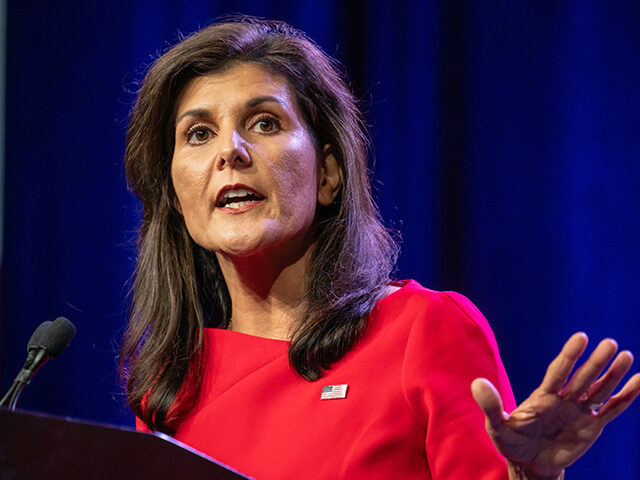CUT AND PASTE YOUTUBE LINKS
Robert Kennedy Jr: Power, Corruption, Freedom, & The Chronic Disease Epidemic Within America
The annual death toll from fentanyl poisoning in U.S. now equals the annual death toll of American soldiers in World War II. But Biden has made no effort to deter the Chinese from poisoning Americans by ending the subsidies we provide to their economy or revoking Most Favored Nation status, or closing all the Confucius Institutes in our universities set up to steal our technologies. From the Chinese point of view, this alone would be worth millions they poured to Biden's pockets. DAVID HOROWITZ
Nikki Haley Adds Five More Proposals to Policy Platform to Combat Communist China

Republican presidential candidate Nikki Haley has expanded her three-tiered policy platform to combat communist China with five more proposals, including rolling back green energy mandates and handouts implemented under the Biden administration “that are a giveaway to China.”
Haley, who served as governor of South Carolina and ambassador to the United Nations in the Trump administration, issued her new proposals in a press release Monday after Fox News first reported them. Haley sees Biden’s energy emissions mandates as an economic benefit to China regarding its solar panel and electric vehicle manufacturing industries while also furthering American dependence on its chief adversary:
Joe Biden’s green energy mandates and handouts benefit China economically and threaten U.S. national security by making us more dependent on China. Biden’s emission mandates will force Americans to transition off affordable and domestically produced fossil fuels, and instead rely on a China-dominated green energy supply chain for electric vehicles and solar panels. For example, sixty three percent of the batteries installed in EVs in 2022 came from Chinese companies. By 2030, China will make more than twice as many batteries as every other country combined. Biden’s Inflation Reduction Act (IRA), also hands out at least $8 billion in investments involving companies based in or with substantial ties to China.
She is eyeing a rollback of “taxpayer-funded handouts” in the partisan Inflation Reduction Act boondoggle, which does not actually deter inflation despite its name. The legislation established hundreds of billions of dollars in green energy spending that the government can dole out through slush funds, Breitbart News noted.
“The Haley administration will have an all-of-the-above energy policy that prioritizes our national security,” according to the press release.
Another aspect of her platform includes “cut[ting] off Chinese drug trafficking money.” Precursor chemicals used to synthesize fentanyl in Mexico often originate from China, and Haley aims to disrupt the trafficking network by focusing on dealers in the United States, in addition to banning the Chinese social media app WeChat, which the Wall Street Journal reported is used by traffickers in a money laundering scheme where drug producers in Mexico are reimbursed with funds from “associates of the Chinese networks.”
Third, Haley seeks to prevent the U.S. government from purchasing technology from China that she says jeopardizes national security.
She pointed to drones as an example, citing a Cyberscoop report that asserted up to 90 percent of the drones first responders used throughout the country as of 2021 were manufactured by DJI. DJI is a Chinese company reportedly tied to the Chinese Communist Party, as Tablet reported, and it “maintains control over data created and compiled by their products.”
Haley intends to “[g]round all Chinese drones and stop new purchases at every level of government,” in addition to preventing states and cities from “using any federal taxpayer money to purchase Chinese technology that threatens our national security.” She aims to employ products produced by America or its allies in place of Chinese technologies.
Moreover, she seeks to end the Scientific and Technological Cooperation Agreement (STA) between the United States and China, which has been in place for decades, as Reuters noted in June. The program is set to expire later this month, and there is reportedly a divide in Biden’s State Department over whether or not to renew the agreement for another five years. As China is notorious for intellectual property theft, critics have called for the end of the program.
Haley pointed to a 2018 project under the STA where China and the United States used balloons for research on the atmosphere. In June, U.S. House Select Subcommittee on the CCP Chairman Mike Gallagher (R-WI), along with nine other members of Congress, sent a letter to Secretary of State Antony Blinken noting that earlier this year, “the [People’s Republic of China] used similar balloon technology to surveil U.S. military sites on U.S. territory.” The letter urged the State Department not to reenter the deal.
WATCH — Nikki Haley: China “Is the Biggest Threat We’ve Had Since Pearl Harbor”:
“If Biden chooses to renew it, President Haley will pull the United States out of it,” the candidate’s press release stated.
Lastly, she advocated against lifting any sanctions on China, slamming the CCP as “human rights abusers.”
“A Haley administration will not take the screws off China for its genocide, trampling of freedom and human rights in Hong Kong, fentanyl production, and military-civil fusion program,” Haley’s release said.
The five newest additions, first reported by Fox News, accompany Haley’s overarching vision to take on China domestically, economically, and militarily, which she detailed at the American Enterprise Institute in late June.
No comments:
Post a Comment